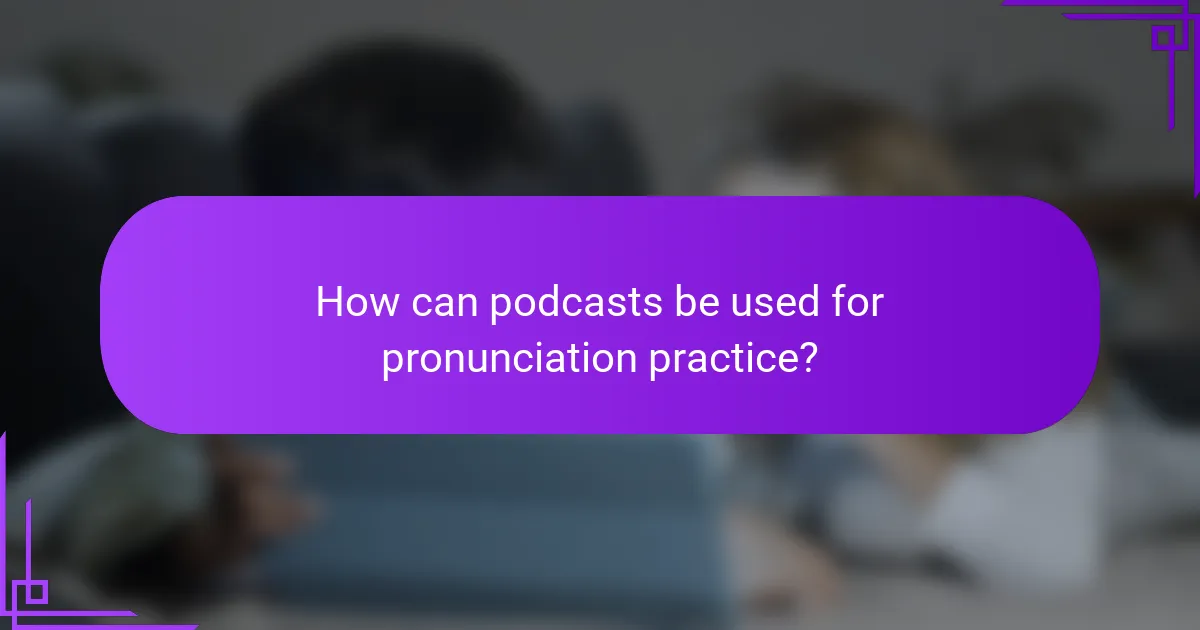Podcasts serve as a valuable tool for English language learners by enhancing their listening skills through engaging and accessible audio content. With a wide range of topics and formats, they encourage active listening and comprehension practice, making language learning both enjoyable and effective.

How do podcasts enhance listening skills for English learners?
Podcasts significantly enhance listening skills for English learners by providing accessible, engaging audio content that promotes active listening. They offer a variety of topics and formats, making it easier for learners to practice their comprehension in a context that interests them.
Engaging content
Podcasts often feature dynamic storytelling, interviews, and discussions that capture listeners’ attention. This engaging content encourages learners to stay focused and motivated, which is crucial for developing listening skills. By selecting topics that resonate with their interests, learners are more likely to immerse themselves in the material.
To maximize engagement, learners should choose podcasts that align with their proficiency level. Beginners might prefer simpler, slower-paced shows, while advanced learners can tackle more complex discussions. Regularly listening to engaging content helps reinforce vocabulary and comprehension skills.
Real-life language exposure
Podcasts provide authentic language exposure, allowing learners to hear how English is used in everyday situations. This real-life context helps learners understand idiomatic expressions, slang, and cultural references that are often absent from traditional learning materials. Exposure to natural speech patterns enhances listening comprehension.
To benefit from this exposure, learners should actively listen and take notes on new phrases or expressions. Replaying sections of podcasts can also help clarify difficult passages, reinforcing understanding through repetition. Engaging with real-life language prepares learners for actual conversations.
Diverse accents and dialects
Podcasts feature speakers from various regions, showcasing different accents and dialects. This diversity helps learners become accustomed to the variations in pronunciation and speech patterns they will encounter in real-world interactions. Familiarity with different accents enhances overall listening skills.
To effectively navigate diverse accents, learners should seek out podcasts that feature speakers from different English-speaking countries. Regular exposure to various dialects can build confidence and improve comprehension, making it easier to understand a wider range of speakers in everyday situations.

What are effective podcast recommendations for English language learners?
Effective podcasts for English language learners provide engaging content that enhances listening skills while exposing learners to diverse accents and vocabulary. These recommendations focus on clarity, educational value, and accessibility, making them ideal for various proficiency levels.
BBC Learning English
BBC Learning English offers a wide range of podcasts designed specifically for English learners. Each episode features clear pronunciation and covers topics from grammar to current events, making it suitable for learners at different levels.
One of the standout features is the “6 Minute English” series, which provides short, manageable episodes that focus on everyday topics. This format allows learners to practice listening without feeling overwhelmed.
ESL Pod
ESL Pod is tailored for English learners, featuring slow-paced conversations and detailed explanations of vocabulary and phrases. The hosts often discuss cultural aspects alongside language, enhancing the learning experience.
Each episode typically lasts around 30 minutes, allowing for in-depth exploration of topics. Learners can benefit from the accompanying transcripts, which help reinforce comprehension and vocabulary retention.
EnglishClass101
EnglishClass101 provides a comprehensive approach to language learning through podcasts that cater to various proficiency levels. The content includes dialogues, vocabulary lessons, and cultural insights, making it engaging and informative.
With episodes ranging from a few minutes to over an hour, learners can choose based on their available time and focus. The platform also offers additional resources, such as lesson notes and quizzes, to enhance the learning process.

How can learners integrate podcasts into their study routine?
Integrating podcasts into a study routine can enhance listening skills and comprehension in English language learning. By dedicating specific times for podcast listening, learners can improve their language skills while enjoying diverse topics and formats.
Daily listening practice
Daily listening practice is crucial for developing fluency and comprehension. Aim for at least 20-30 minutes of podcast listening each day, selecting content that matches your proficiency level. This consistency helps reinforce vocabulary and improves overall listening skills.
Consider setting a specific time each day for this practice, such as during your commute or while exercising. This routine can make it easier to incorporate podcasts into your daily life.
Note-taking strategies
Effective note-taking can enhance retention and understanding of podcast content. Use a structured format, such as bullet points or mind maps, to capture key ideas and vocabulary. This approach helps you focus on important information while listening.
After each episode, review your notes and summarize the main points. This reinforces learning and aids in recalling information during discussions or further studies.
Discussion groups
Joining discussion groups can significantly enhance the learning experience from podcasts. Engaging with peers allows you to share insights, clarify doubts, and practice speaking skills. Look for local or online groups that focus on English language learning through podcasts.
When participating, prepare by discussing specific episodes or themes. This preparation can lead to more meaningful conversations and deeper understanding of the material.

What are the benefits of using podcasts for language acquisition?
Podcasts offer numerous advantages for language acquisition, particularly in enhancing listening skills. They provide authentic audio content that exposes learners to natural speech patterns, varying accents, and real-life vocabulary, making them a valuable resource for improving overall language proficiency.
Improved comprehension
Listening to podcasts helps learners develop better comprehension skills by familiarizing them with the rhythm and intonation of the language. Regular exposure to spoken English in various contexts allows learners to understand nuances and implied meanings more effectively.
To maximize comprehension, choose podcasts that match your current language level and gradually increase the difficulty. Engaging with content that interests you will also keep you motivated and enhance your understanding of complex topics.
Vocabulary expansion
Podcasts introduce learners to a wide range of vocabulary, including colloquialisms and specialized terms relevant to different fields. This exposure helps learners acquire new words in context, making it easier to remember and use them appropriately.
To expand your vocabulary effectively, take notes while listening and look up unfamiliar words. Consider creating a personal glossary of new terms and reviewing them regularly to reinforce your learning.
Cultural insights
Podcasts often reflect cultural nuances and societal issues, providing learners with insights into the culture associated with the language. Understanding cultural references and idiomatic expressions enhances language skills and fosters a deeper connection to the language.
To gain cultural insights, select podcasts that discuss topics relevant to the culture of the language you are learning. Engaging with diverse perspectives will enrich your understanding and appreciation of the language beyond mere vocabulary and grammar.

What criteria should learners consider when choosing podcasts?
When selecting podcasts for English language learning, learners should focus on language level, topic interest, and length and format. These criteria ensure that the content is both accessible and engaging, enhancing the overall learning experience.
Language level
Choosing podcasts that match your language proficiency is crucial. Beginners might benefit from podcasts designed for learners, which often feature slower speech and simpler vocabulary. Intermediate and advanced learners can explore more complex topics and natural speech patterns to improve comprehension and fluency.
To assess language level, consider the podcast’s description and listen to a sample episode. If the vocabulary and pace feel comfortable, it’s likely a good fit. Aim for podcasts that challenge you without causing frustration.
Topic interest
Selecting podcasts on topics that genuinely interest you can significantly enhance motivation and retention. Whether it’s technology, culture, or personal development, engaging content keeps listeners attentive and eager to learn. This connection to the material can lead to better understanding and recall of new vocabulary.
To find podcasts that align with your interests, browse categories or search for specific themes. Many platforms offer curated lists based on popular topics, making it easier to discover content that resonates with you.
Length and format
The length and format of podcasts can impact your learning experience. Shorter episodes, typically ranging from 10 to 30 minutes, are often easier to digest and fit into busy schedules. Longer episodes may provide more in-depth discussions but could be overwhelming for some learners.
Consider your listening habits when choosing a format. Some podcasts include transcripts, which can be helpful for following along and reinforcing learning. Others may feature interactive elements, such as quizzes or discussion prompts, which can further enhance engagement.

How can podcasts be used for pronunciation practice?
Podcasts can effectively enhance pronunciation skills by providing authentic listening experiences. They expose learners to various accents, intonations, and speech patterns, allowing for practical application in real-world contexts.
Shadowing technique
The shadowing technique involves listening to a podcast and simultaneously repeating what is heard. This method helps learners mimic the speaker’s pronunciation, rhythm, and intonation, reinforcing correct speech patterns. Start with short segments, focusing on clarity and accuracy before gradually increasing the length of the audio.
To maximize benefits, choose podcasts that feature clear and articulate speakers. Aim for daily practice sessions of about 10-15 minutes to build confidence and fluency over time.
Listening and repeating
Listening and repeating is a straightforward method where learners pause the podcast after each sentence or phrase to repeat it aloud. This practice allows for focused attention on specific sounds and helps in correcting mispronunciations. It is beneficial to use podcasts that provide transcripts, enabling learners to see the text while listening.
Incorporate this technique into your routine by dedicating time each week to practice with different podcast episodes. Aim for sessions of 20-30 minutes to ensure ample repetition and reinforcement.
Accent imitation
Accent imitation involves closely mimicking the accent of the podcast speaker. This technique not only improves pronunciation but also enhances overall listening comprehension. Select podcasts that feature diverse accents to broaden your exposure and adaptability.
To effectively imitate an accent, listen to short clips and focus on specific sounds or phrases. Record yourself to compare your pronunciation with the original speaker, adjusting as necessary. Regular practice will help in developing a more natural accent over time.


